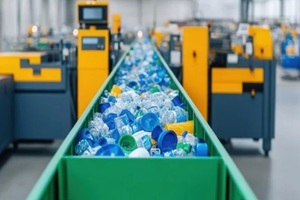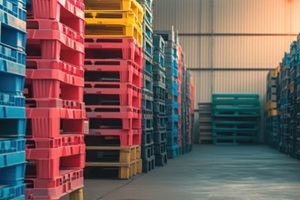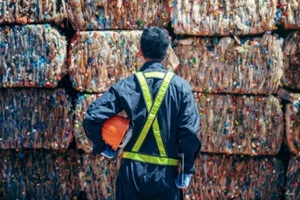February 6, 2025

Reusable transport packaging presents a powerful opportunity for businesses to meet plastic recycling & sustainability goals while realizing significant cost savings. Prioritizing both greater durability and reusability over single-use alternatives, this approach meets the ever-increasing call from consumers for organizations to adopt environmentally conscious practices.
As regulations around packaging and corporate sustainability reporting continue to tighten, organizations face increasing pressure to adopt strategies that balance ecological responsibility with overall financial viability.
Reusable packaging offers both financial and environmental benefits, making it a practical choice for businesses aiming to balance costs with sustainability.
Reusable systems significantly reduce long-term costs by minimizing dependence on single-use packaging materials and plastic recycling. Businesses can directly benefit from lower recurring expenses, as durable packaging options last longer and require fewer replacements.
Additionally, improved operational efficiency arises from consistent and reliable packaging solutions that reduce downtime and streamline logistics.
Over time, the cost-per-use of reusable materials decreases, creating a strong financial incentive for companies to adopt them. With the declining cost of reusables and the increasing expenses associated with disposables, the economic case for switching to reuse has never been stronger.
Reusable packaging delivers substantial environmental benefits that help companies meet growing sustainability demands. These systems dramatically cut down on waste production, which helps reduce strain on landfill capacity, plastic recycling systems, and waste management processes.
These systems minimize carbon emissions by cutting down on the need for repeated production and waste management. Unlike traditional plastic recycling, reuse focuses on prolonging the lifecycle of materials. For organizations pursuing net-zero goals, reusable models offer a direct way to decrease their carbon footprint while addressing regulatory pressures.
Collaboration and technology are transforming the way companies manage reusable packaging, driving both cost savings and greater sustainability. Through shared resources and data-driven strategies, businesses can improve their operations, cut down on expenses, and meet shifting regulatory demands over time.

Pooling models have emerged as an effective way for companies to share the costs and benefits of reusable packaging systems. Taking advantage of supply chain collaboration allows businesses to collectively manage assets such as pallets, crates, and containers, significantly reducing the financial burden on any single organization.
Centralizing important processes of collection, sanitization, and redistribution creates operational efficiencies that can save time and resources for all participants. These shared systems also contribute to environmental goals by lowering the overall carbon footprint of production, as fewer materials need to be manufactured and transported.
Advanced tracking and analytics tools are actively unlocking new opportunities for organizations to optimize their utilization of reusable systems and improve plastic supply chains.
These technologies allow businesses to measure the environmental and financial impacts of their packaging decisions with greater precision than before. Monitoring essential data, including reductions in carbon emissions and material reuse rates, helps businesses fine-tune their approaches to reusable adoption for more effective outcomes.
Compliance with increasingly strict regulations becomes far more manageable when companies use data to demonstrate progress and identify areas for improvement. Adopting a data-driven approach here strengthens the case for reusables and empowers businesses to maximize their impact.
Join our PLASTICS Pulse newsletter today to receive updates on within the plastic industry while staying informed & connected.
Encouraging widespread adoption of reusable packaging is best achieved with a combination of clear communication and a shift in how businesses perceive these systems.
Stakeholders are more likely to support reusable packaging systems when they understand the tangible benefits these solutions provide. Presenting reusables to stakeholders in terms of cost savings and environmental advantages creates a compelling narrative that widely resonates across different audiences.
Using straightforward financial language, businesses can link the monetary savings from reduced material expenses and improved operational efficiency with the reduced carbon emissions that come from extending packaging lifecycles.
Concerns about the initial costs of adopting reusables often hinder progress, but these perceptions can be addressed through reframing. Instead of viewing reusables as an expense, companies should approach them as valuable assets that provide long-term returns.
From reducing waste management costs to meeting sustainability regulations more effectively, reusables deliver benefits that far outweigh their upfront investments. Encouraging this mindset shift helps businesses recognize the potential of reusable systems to drive both profitability and environmental progress.

Reusable systems offer a powerful solution for businesses that are looking to balance their sustainability efforts with greater financial performance. They actively reduce waste, lower carbon emissions, reduce reliance on plastic recycling, and provide measurable cost savings, making them an essential part of modern supply chains and a boon for the companies that embrace them.
The shift to reusables opens doors to improved efficiency while responding to environmental issues and complying with regulatory expectations. With this in mind, manufacturers and industry professionals have an opportunity to lead the way in terms of sustainable innovation.
PLASTICS connects industry organizations and businesses utilizing plastic supply chains with valuable resources, cutting-edge solutions, and an array of exclusive membership benefits. For additional information and resources, consider joining the Plastics Industry Association, PLASTICS.
PLASTICS and the Future Leaders in Plastics (FLiP) Committee are devoted to supporting and encouraging the next generation of plastics leaders who will play a crucial role in the innovation, technology and future of the plastics industry. FLiP’s mission is to provide young professionals under the age of 40 the exposure, education and resources they need to build lifelong careers in plastics. Want to join? Want to get your employees involved? Email: [email protected]